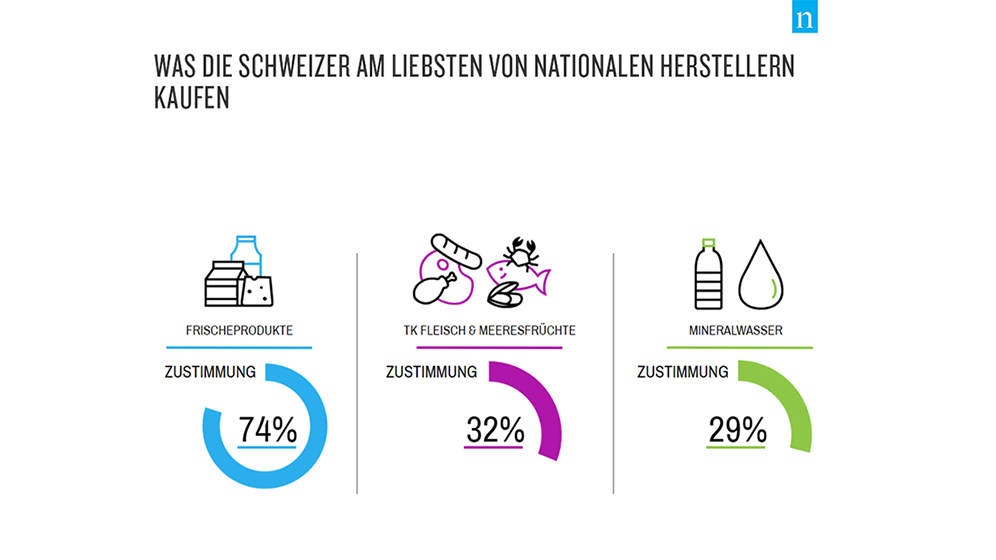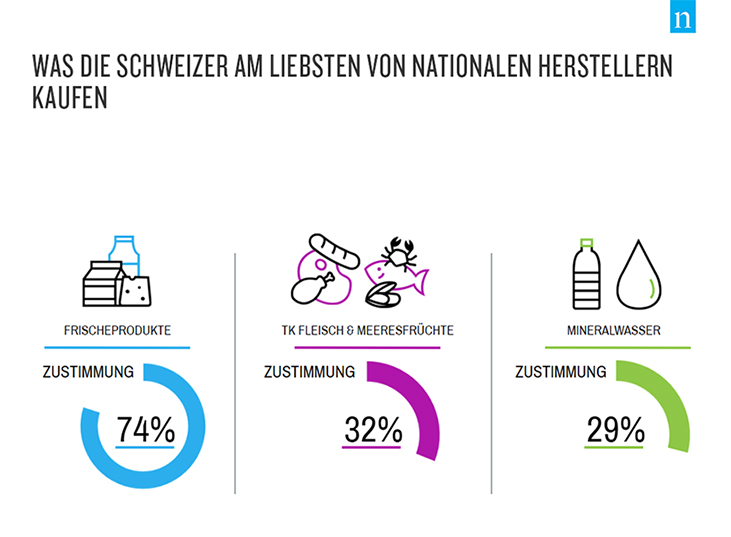What goes in the bag: This is what shopping baskets look like in Switzerland
A recent study shows that consumers in this country attach importance to the fact that only a few products come from Switzerland. Only when buying milk, butter and cheese are local producers preferred. At the same time, most people are becoming increasingly aware of the characteristics of products.

Irish butter, French hand cream, American cat food: for most everyday goods, national borders hardly play a role for consumers in Switzerland. This applies equally to food, cosmetics and household products. The only exception is dairy products: In this country, most consumers (74%) prefer to buy only what is produced in Switzerland. This puts Switzerland in the middle of the pack in a European comparison. Consumers from Austria, Poland and Greece place even greater emphasis on national origin when it comes to dairy products.
This is the conclusion of the "Global Brand Origin" study by Nielsen, a global performance management company that provides information and insights into media and consumer behavior. The study examined how consumers in 63 countries feel about buying products from local and global manufacturers. The survey polled 31,500 consumers in 63 countries in the Asia-Pacific, Europe, Latin America, Middle East, Africa and North America regions between May 22 and June 22, 2017.

Only rarely local products favored
The study analyzes the so-called "fast moving consumer goods" around the product groups of care and cosmetic products, beverages, fresh food and non-perishable food. It shows that local products are favored by more than 25 percent of respondents in only six of the 27 product areas. "Consumers are becoming global shoppers," explains Judith Kuiper, managing director of Nielsen Switzerland. "Whether it's Bern or France, our study shows that for many consumers, there are often no longer any national borders in the supermarket when it comes to everyday goods."
At the top of the list of products that the Swiss prefer to buy from national producers are fresh products such as cheese, butter or milk (74%). Second place goes to frozen meat and seafood (32%). "The figures show that the Swiss are basically open to products from international manufacturers. However, this does not necessarily mean that they don't care where the products come from," explains Judith Kuiper. "On the contrary, we observe that many consumers are increasingly conscious of their purchases and look closely at what characteristics a product has."
Palates and habits are becoming increasingly global.
The results for the care products segment show: Only four percent of parents in Switzerland prefer to buy products from national manufacturers here. International manufacturers are also in demand for feminine care products (7% national) and oral hygiene products (10% national). In the beverages product group, energy drinks stand out in particular, with only ten percent of Swiss consumers preferring to buy from Swiss manufacturers. A similar phenomenon can be observed in shelf-stable foods. "All in all, our study shows that palates and habits are becoming increasingly global," says Judith Kuiper. "The mix between national and international preferences, i.e. that people prefer to buy dairy products more locally, is not going to change anytime soon. Still, there are big differences in European comparisons."
Only twelve percent of the Swiss believe that a cleaning product should come from national manufacturers, while 23 percent in Estonia and 31 percent in Greece hold this view.
Food purchasing in a European comparison The study shows: Even though the Swiss prefer dairy products from national producers in particular (74%), they are significantly more open than countries such as Greece (84%), Poland (81%) or Austria (80%). And for products such as personal care or cosmetics, Switzerland is even ahead of countries that are comparatively open to international fresh products, such as the UK or Spain. One example: Only twelve percent of the Swiss believe a cleaning product should come from national manufacturers, while 23 percent in Estonia and 31 percent in Greece hold this view.
Bakers and butchers high in demand
When it comes to the question of where the Swiss prefer to buy their food, a differentiated picture also emerges: Buying fresh food in the store around the corner is a priority for many consumers. "In smaller stores, the origin of the products is usually known. The aspect of trust also plays a major role here. So it's clear that even though global brands are in demand in other segments, regionality is also very much in vogue," says Judith Kuiper. Almost 70 percent of consumers rely on local stores to buy fruit and vegetables. When buying fresh meat, fish, eggs (54 percent) and baked goods (59 percent), consumers prefer local stores. (pd/ank)








